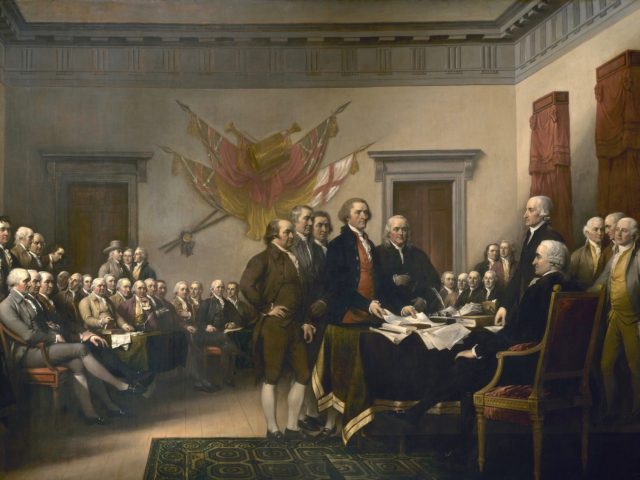Prime Minister Boris Johnson’s Conservative Party should pass a Free Speech Act modelled on the United States First Amendment to protect against the increasingly woke limitations on expression in the UK, a leading think tank said.
The Adam Smith Institute (ASI), a neoliberal — and formerly libertarian — British think tank said that the current speech laws in Britain — which are largely based off of Article 10 of the European Convention — are “woefully inadequate” as they have created a class of “speech crimes”.
The report, authored by technology lawyer and Legal Fellow at the Adam Smith Institute Preston J. Byrne, said: “The United Kingdom has placed public discourse in the hands of the easily offended, who have the power to threaten fellow citizens with fines and imprisonment for expressing unpopular opinions or having uncomfortable conversations.”
“Freedom only to speak inoffensively is not worth having. The British people no longer have freedom of speech. The time is ripe for Parliament to step in to restore this most essential and ancient of our liberties,” Preston wrote in The Telegraph.
The report called for the Conservative Party — which enjoys an 80 seat majority in the House of Commons — to pass a Free Speech Act modelled on the First Amendment of the United States Constitution.
The think tank also said that the law should take into consideration the jurisprudence surrounding speech laws in America, in order to protect all speech, aside from categories that are not protected anywhere in the world, such as incitement of violence, criminal threatening, harassment, malicious defamation, perverting the course of justice, or perjury.
UK Police Tell Public: Report 'Hateful' Behaviour 'Even If It Isn't a Crime', 'You Don't Even Need Evidence' https://t.co/qzTTp3vFot
— Breitbart London (@BreitbartLondon) October 21, 2019
The ASI went on to call for the government to remove all references to “abusive” or “insulting” words and behaviour in the Public Order Act of 1986.
“There is mounting evidence that longstanding legislative provisions including the Public Order Act 1986, Communications Act 2003, Terrorism Act 2000 and 2006, and the Malicious Communications Act 1988 are increasingly being applied in an overly broad fashion which was not contemplated by their drafters,” Preston wrote.
“The imprecise drafting of existing law means that as social attitudes shift to narrow the confines of “acceptable” debate, broader categories of speech will be criminalised as “offensive,” “distressing” or “hateful”,” he explained.
Preston pointed to the high profile cases of prosecution of YouTuber Count Dankula, the police investigation of youth political commentator Darrem Grimes, and the public order conviction of Bethan Tichborne, as examples of the “rapid slide” in freedom of expression protections in the UK.
“Shockingly, over 400 people were arrested in London alone over the last five years for communicating in an ‘offensive nature,’ sending an ‘offensive message’ and/or sending ‘false information,'” he added.
Had a chat with Breitbart over Scotlands new proposed hate crime bill that infringes on the human right of free speech.https://t.co/2br7xfRoMW
— Kamala Haggis🏴🏳️🌈 (@CountDankulaTV) July 26, 2020
The report also referenced the recent push from the Law Commission to criminalise the publication of “Islamophobic cartoons” such as the caricatures of the Islamic prophet in the French satirical magazine Charlie Hebdo.
Finally, the Adam Smith Institute pointed to the impending Scottish Hate Crime and Public Order (Scotland) Bill, which would criminalise speech that is “likely” to “stir up hatred” against supposedly marginalised groups, without consideration of the intent.
The United Kingdom — which unlike the United States does not have a written constitution — has also embarked on a campaign to record tens of thousands of so-called ‘non-crime hate incidents’ in police criminal databases. That means that those found to have committed such “offences” will turn up on background checks, despite not having committed an actual crime.
The effort to combat “hate” in the UK has also seen police forces call upon the British public to snitch on their fellow citizens if they have made “offensive or insulting comments, online, in person or in writing”.
Mr Preston warned that “the sun is setting on the Enlightenment in the United Kingdom. Before it’s too late, we must take steps to protect our most fundamental of rights: the freedom to express ourselves.”
‘Neo-Marxist Idea’: Free Speech Activists Slam Proposal for Hate Crime Laws to Cover Conversations at Home https://t.co/5XWT2y5rPn
— Breitbart London (@BreitbartLondon) November 4, 2020
Follow Kurt Zindulka on Twitter here: @KurtZindulka

COMMENTS
Please let us know if you're having issues with commenting.